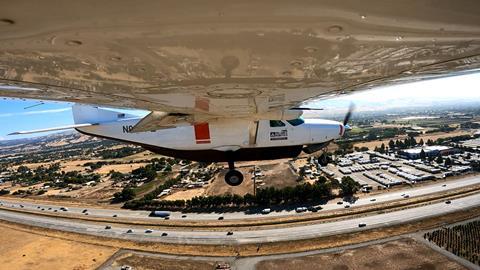US technology developer Reliable Robotics has completed flight tests intended to demonstrate that its autonomous systems can allow pilotless aircraft to operate safely in air-traffic-control-managed airspace.
The start-up on 21 August said it performed the tests, which included three flights of its Cessna 208 Caravan, in Northern California in recent weeks. The work demonstrated that aircraft equipped with Reliable’s technology can be operated safely in busy areas of US airspace, it says.

“The test construct demonstrated Reliable’s ability to execute vectoring, airspeed diverts and fly under various simulated weather conditions in simulated Class B airspace,” says Mountain View, California-based Reliable. Class B airspace is managed by FAA controllers and is typically near busy airports, says the FAA.
Reliable is working to certificate and commercialise autonomous flight systems that can control aircraft throughout flights, including during take-off and landing, and while taxiing. It has initially aimed to certificate a modified Caravan. Aircraft equipped with its systems can be overseen from the ground by human operators who can communicate with air traffic controllers, Reliable has previously said.
The most-recent evaluations involved “a series of simulations and flight tests demonstrating successful integration of remotely piloted aircraft systems into congested airspace”, Reliable says.
As part of the effort, the company completed three test flights using the Pratt & Whitney Canada PT6A-powered Caravan, including those on 25 July and 15 August, says Reliable’s vice-president of government partnerships Davis Hackenberg. “Reliable was able to minimise the number of live flight days through extensive use of our simulation and hardware-in-the-loop lab capabilities.”
Reliable’s test aircraft is a 208B Super Cargomaster variant of the single-turboprop, and the aircraft is owned by FedEx, according to Cirium data.
The flight tests occurred during visual flight rules, and a human pilot was aboard the Caravan, handling “communications with local air traffic”. Also, a “ground operator” based in Mountain View communicated with FAA air traffic controllers from the agency’s NextGen Integration and Evaluation Capability office. That FAA division studies new air traffic management technologies.
Additionally, Reliable says the tests involved “verbal and digital communication” with controllers and OneSky, a US company developing air traffic management products for pilotless aircraft
“The collaboration showcases seamless integration of Reliable’s automation system with third-party service providers and sets the stage for enhanced aviation safety and a future where un-crewed aircraft coexist alongside traditional aircraft,” Reliable says. “Our Mountain View control centre received real-time digital and voice information from the aircraft, issued commands to the aircraft and submitted flight-test plans to OneSky.”
The FAA funded the tests through a programme with Embry-Riddle Aeronautical University, and the evaluations were part of the agency’s Urban Air Mobility Airspace Management Demonstration programme, says Reliable. Through that FAA programme, the agency is studying how pilotless aircraft can operate in controlled airspace, FAA documents show.
Started in 2017, Reliable also owns New Mexico-based Reliable Airlines, which operates six 208B Caravans, Cirium fleets data shows.


























